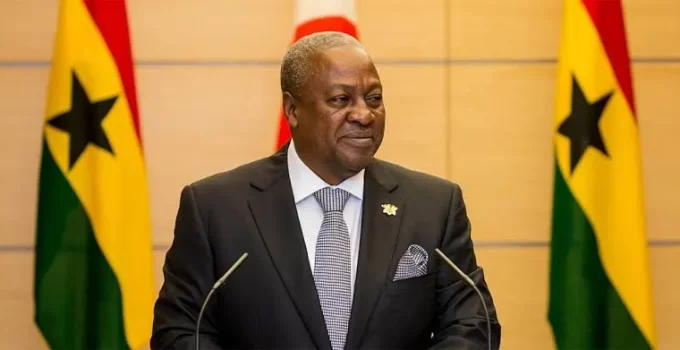
Opposition Leader John Mahama Wins Ghana’s Presidential Race
In a historic moment, Ghana’s Vice President, Mahamudu Bawumia, has accepted defeat in the presidential election. This outcome marks a significant shift in the nation’s political landscape, as it brings an end to the ruling party’s eight-year leadership of this West African country.
The election results come at a time when Ghana experiences its worst economic crisis in a generation. Citizens need a leadership change to tackle their mounting challenges. The peaceful transition proves Ghana’s democratic strength and opens a new chapter in the country’s future. The opposition now prepares to implement economic reforms and social development programs.
Historic Power Shift in Ghana
Former President John Dramani Mahama has made an incredible comeback in Ghana’s presidential election. Vice President Mahamudu Bawumia accepted the opposition’s victory. The National Democratic Congress (NDC) won decisively. Internal party reviews reveal Mahama got 56.3% of the votes while Bawumia received 41.3%.
The NDC’s success goes beyond just winning the presidency. The party’s internal numbers show they now control about 185 parliamentary seats. This gives them a strong majority in the legislature. Their victory sets several records in Ghana’s history:
- Mahama becomes the first president in Ghana’s Fourth Republic to return to power after losing an election
- The New Patriotic Party’s (NPP) eight-year rule under President Nana Akufo-Addo ends
- The opposition party now holds a clear majority in parliament
Several prominent NPP parliamentarians lost their seats to NDC candidates in key constituencies. Bawumia’s quick acceptance of defeat before the Electoral Commission’s official announcement shows his commitment to keep the peace. During his concession speech, Bawumia said, “The people of Ghana have spoken, the people have voted for change at this time and we respect it with all humility”.
Ghana continues its tradition of peaceful power transfers between its two main parties since multiparty politics returned in 1992. The NDC’s strong showing in both presidential and parliamentary races gives them a clear mandate to tackle the country’s economic challenges.
Economic Crisis Impact
Ghana’s economic crisis played a decisive role in recent election results. The country faced its toughest economic challenges yet. Inflation jumped to 54.1% in December 2022, and the government had no choice but to ask for a GHS 47.25 billion IMF bailout. Things got worse as poverty levels climbed to 30.3% in 2023. The rising costs of basic goods and services pushed about 850,000 Ghanaians into poverty.
The economy shows some promising signs with GDP growth bouncing back to 5.8% in early 2024. However, people still feel the pinch in their daily lives. The country’s debt problems led to a major restructuring plan. This plan aims to cut debt by GHS 74.03 billion and provide much-needed cash flow relief of GHS 69.30 billion during the current IMF program.
The economy faces several tough challenges:
- The currency lost more than 60% against the dollar
- 32% of young people can’t find jobs
- Public debt reached 72.3% of GDP by December 2023
The new government has a tough job ahead – they need to fix the economy while taking care of people’s needs. People voted for change because they were frustrated with how the economy was handled. An Afrobarometer survey showed 82% of Ghanaians thought their country was going in the wrong direction. The incoming administration must tackle these issues while sticking to IMF program rules, especially when managing finances and keeping debt under control.
Democratic Precedent
Ghana’s 2024 presidential election success strengthens its position as a democratic leader in West Africa. The country has held eight democratic elections since 1992, which led to three peaceful power transitions between political parties. This latest change marks another step forward in the nation’s democratic development.
The election process got substantial international attention due to several achievements:
- Strict compliance with constitutional term limits
- High voter participation and competitive elections
- Courts’ peaceful resolution of election disputes
- Active civil society participation in election monitoring
The US Embassy praised Ghanaians because their election “reflects the will of the people,” which shows the value of democratic transitions. This acknowledgment comes at a vital time when West Africa faces major democratic challenges, with Ghana emerging as a democratic bulwark in an unstable region.
International observers from ECOWAS and the Commonwealth monitored the Electoral Commission’s outstanding performance. The Commission’s transparent and efficient approach helped build public trust in the election system, despite fierce competition between the two main parties.
This smooth transition becomes even more meaningful during regional political unrest. Ghana’s democratic stability amid economic challenges proves its democratic institutions’ strength. Support from organizations like NDI and IRI, along with international community involvement, has enhanced the country’s election processes and democratic foundations.
Ghana’s 2024 presidential election shows the country’s democratic maturity and readiness for change. Opposition leader John Dramani Mahama won decisively with 56.3% of votes. His NDC party also secured a parliamentary majority, giving citizens a clear mandate to change economic direction. This peaceful transition has strengthened Ghana’s role as a democratic leader in West Africa, especially during regional instability.
The new government faces major economic hurdles. High inflation, falling currency value, and massive public debt top their list of challenges. Their success depends on how well they balance IMF program requirements with pressing social needs. They must also keep public trust through open and honest governance.
Ghana’s democratic system has shown remarkable strength throughout this election. The country’s constitutional processes work effectively and power changes hands peacefully. This proves Ghana’s political stability and brings hope for democracy across West Africa. Ghana can now tackle its economic problems while protecting democratic values that will benefit future generations.






